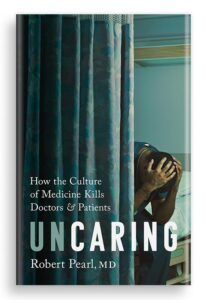In 2020, the deadliest year in U.S. history, the life-expectancy gap between Black and white Americans grew significantly wider.
White people experienced a one-year decline in longevity, from 79 years to 78, while Black Americans saw their life expectancy sink from 75 years to 72.
A major contributor to the overall reduction in life expectancy was Covid-19, the third-leading killer last year behind heart disease and cancer. But how do we explain why Black people have died at nearly twice the rate of white people from the virus?
Physicians often point to socioeconomic factors to explain the discrepancy. Racial minority groups are more likely to work essential (frontline) jobs, commute via public transit, live in more congested neighborhoods, and experience unequal health insurance coverage. Of course, all of these factors did contribute to higher rates of Covid-19 infection and death among the Black population in the United States.
But there’s something important missing from this account. What’s missing is the role doctors themselves play in the declining health and increasing mortality of Black Americans.
This is a side to U.S. healthcare that physicians would prefer to keep hidden—unexamined and undiscussed in public discourse. This side of the story deals with physician culture, an invisible but highly influential force in medicine.
My newest book, Uncaring: How the Culture of Medicine Kills Doctors & Patients, tackles the race issue in medical practice, along with dozens of other social, economic and political challenges facing American healthcare.
The book shines a light on the norms, values, and beliefs that shape the decisions doctors make, and it explores the consequences of physician culture on all of us.
Starting in medical school, doctors are taught a series of important lessons that they carry throughout their careers. For instance, they learn that physicians save a life at any cost, put the needs of every patient ahead of their own, and treat all patients equally. But through observation of more senior colleagues, young doctors also learn to violate these virtuous principles when it is in their own interest to do so.
“Studies show that two-thirds of physicians harbor implicit bias against Black patients, viewing them less favorably than white patients. Of course, doctors are unaware of these subconscious biases, reinforcing the cultural assumption that they treat all patients the same.”
Medical culture is filled with values and beliefs that help doctors summon the courage, strength, and dedication needed to fight diseases like Covid-19 effectively. Filled with inspiration and drive, doctors battled the coronavirus, despite a dire lack of protective equipment and the medical tools needed to win the fight.
Much has been written about these heroics. Little has been disclosed about the less-virtuous side of medical culture and its deadly impact on patients.
Racially, the healthcare profession has, for centuries, been led by white men. The result is a physician culture oblivious to its own biases. Rather than treating every patient the same, doctors continue to provide inferior care to Black individuals—wholly unaware that they are contributing to poorer quality outcomes for these patients.
Anyone who would question this conclusion need only ask the following questions.
If doctors really did treat all patients equally, then why were Black patients tested for Covid-19 far less often than white patients when they came into the ER with identical symptoms? If Black patients are twice as likely to die from Covid-19, then why wouldn’t doctors test African Americans more (not less) frequently?
Furthermore, why do doctors prescribe 40 percent less pain medication to Black patients after surgery than white patients? Why are Black women less likely to be offered breast reconstruction after mastectomy? And why are Black women three times more likely to die from childbirth than white women—except when the treating physician is Black?
The list of questions goes on and on. But the answer is always the same: A combination of personal bias and cultural racism permeates American medicine.
Studies show that two-thirds of physicians harbor implicit bias against Black patients, viewing them less favorably than white patients. Of course, doctors are unaware of these subconscious biases, reinforcing the cultural assumption that they treat all patients the same.
Medicine in the twenty-first century contains far fewer examples of the kind of overt racism that permeated the prior century and fueled indefensibly harmful actions, like the Tuskegee Study of Untreated Syphilis in the Negro Male—a series of deadly experiments performed on Black sharecroppers without their knowledge or consent.
Today’s physicians are predominantly well-intentioned, but they inflict harm just the same. They are persuaded by the stories they describe themselves as virtuous and equitable healers, causing them to ignore and overlook the truth of their actions. Research has demonstrated that white physicians have more empathy for patients whose skin color and background match their own. The culture of medicine shields doctors from seeing the harm that implicit bias and institutional racism cause.
Uncaring explores how physician culture contributes to the premature deaths of tens of thousands of people in the United States each year and what patients of all races can do to avoid being harmed. All profits from the book will be donated to Doctors Without Borders, a charity dedicated to expanding healthcare around the globe. To learn more, visit RobertPearlMD.com.

 Dr. Robert Pearl (ALF Class XVII) is the former CEO of The Permanente Medical Group (Kaiser Permanente). Named one of Modern Healthcare’s 50 most influential physician leaders, Pearl currently serves as a clinical professor of plastic surgery at Stanford University School of Medicine and is on the faculty of the Stanford Graduate School of Business. He is the author of Mistreated: Why We think We’re Getting Good Healthcare—And Why We’re Usually Wrong, a Washington Post bestseller that offers a roadmap for transforming American healthcare. His next book, Uncaring: How the Culture of Medicine Kills Doctors and Patients will be published May 2021. All proceeds from both books go to Doctors Without Borders.
Dr. Robert Pearl (ALF Class XVII) is the former CEO of The Permanente Medical Group (Kaiser Permanente). Named one of Modern Healthcare’s 50 most influential physician leaders, Pearl currently serves as a clinical professor of plastic surgery at Stanford University School of Medicine and is on the faculty of the Stanford Graduate School of Business. He is the author of Mistreated: Why We think We’re Getting Good Healthcare—And Why We’re Usually Wrong, a Washington Post bestseller that offers a roadmap for transforming American healthcare. His next book, Uncaring: How the Culture of Medicine Kills Doctors and Patients will be published May 2021. All proceeds from both books go to Doctors Without Borders.
Connect with Dr. Robert Pearl on Twitter @RobertPearlMD, LinkedIn and at his website RobertPearlMD.com.




